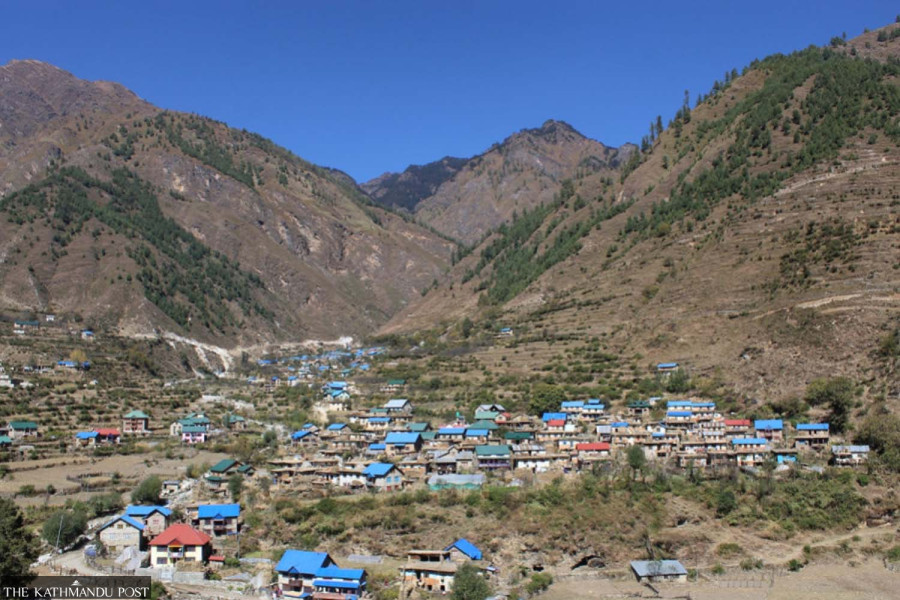Karnali Province
Road connection transforms a Jumla local unit
Improved access brings health, education and market opportunities to residents of Patarasi Rural Municipality.
DB Budha
Gorakh Bahadur Rawat, who is in his mid-forties, of Chaurgaun in ward 3 of Patarasi Rural Municipality, still recalls the hardships villagers faced until a few years ago. There were no roads, no agricultural markets, and quite limited government services in the village. Villagers had to walk for hours to reach Khalanga, the district headquarters of Jumla, to buy essentials and sell their agricultural produce and products.
“Villagers had no alternative but to buy essential commodities in Khalanga and carry them home on their backs. It took at least two days to visit Khalanga and return home with goods. Road construction has changed our lives,” said Rawat. “Now we can reach Khalanga in just a few hours by vehicle. It has been easier to manage essential goods and sell our products,” said Rawat, who makes a living as a farmer.
The Food Management and Trading Company used to distribute subsidised rice from its depot in Khalanga, which is around 20 km far from Chaurgaun. Villagers in Patarasi had to spend at least two days to get a few kilogrammes of subsidised rice.
“The food office sometimes distributed five kilogrammes of rice per person. One had to spend a good amount of money to travel to Khalanga on foot and return. Now, rice, salt, and other essentials are easily available in the local markets at a cheaper price,” said Rawat.
Road construction has transformed Patarasi, a remote local unit in Jumla. Construction started in the Patarasi area in 2003 under the food-for-work programmes, and the road came into full operation from 2017.
“We can now order rice, lentils, salt, cooking oil, sugar, and other essentials, which are delivered right to our doorsteps. In the past, villagers endured much hardship as there was no transportation, but things have changed significantly with the start of road transportation,” said Krishna Bahadur Budha, a local of Lamri.
According to villagers, the road also brought other development infrastructures in Patarasi, including electricity, health, and education. Health camps with specialist doctors are frequently organised in the area, apparently due to improved transportation. Along with the public health services provided by local health posts and community health units, Patarasi now has a private hospital and several private clinics.
Lachhiman Bohara, a former chairman of Patarai Rural Municipality, said that all major settlements in the local unit now have access road access. “There are seven wards in Patarasi, and an ambulance can reach each settlement in case of a medical emergency,” said Bohara. “The road is yet to be blacktopped. Although the dirt road is prone to accidents, it has certainly opened up potential for entire Patarasi,” he added.
Various settlements in Patarasi have transformed into modern villages, with concrete and tin-roof houses gradually replacing traditional thatched and mud homes. Many households have shifted closer to the road.
Local farmers produce beans, apples, potatoes, and buckwheat, among others. With the opening of the road, farmers have found it much easier to access markets for their products. “Farmers are encouraged to increase production as they now have market access, thanks to the road. Each ward has been declared a pocket area for specific crops and fruits,” said Bohara.
As per the national census of 2021, Patarasi has a population of 16,824 across 3,342 households. The local unit is rich in diverse flora and fauna. More than 40 species of medicinal herbs are found in the Patarasi area.
The number of tourists—both domestic and foreign—is on the rise in Patarasi. Visitors are drawn to Chumchaur, known for its Marsi variety of rice, Shankar waterfall, Karnali Institute, founded by renowned anthropologist Dor Bahadur Bista, among other attractions. “All of this is possible thanks to the road,” proclaimed Rawat.




 22.64°C Kathmandu
22.64°C Kathmandu














